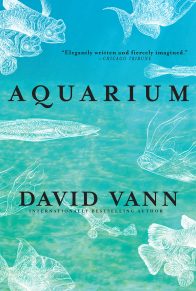About the Book
In his riveting new novel, internationally bestselling New York Times Notable author and Prix Medicis étranger-winner David Vann reimagines his father’s final days. Halibut on the Moon traces the roots of mental illness in one man’s life as he attempts to anchor himself to the places and people that once shaped his sense of identity.
Middle-aged and deeply depressed, Jim arrives in California from Alaska and surrenders himself to the care of his brother Gary, who intends to watch over him. Swinging unpredictably from manic highs to extreme lows, Jim wanders ghost-like through the remains of his old life attempting to find meaning in his tattered relationships with family and friends. As sessions with his therapist become increasingly combative and his connections to others seem ever more tenuous, Jim is propelled forward by his thoughts, which have the potential to lead him, despairingly, to his end.
Halibut on the Moon is a searing exploration of a man held captive by the dark logic of depression and struggling mightily to wrench himself free. In vivid and haunting prose, Vann offers us an aching portrait of a mind in peril, searching desperately for some hope of redemption.
Praise for Halibut on the Moon:
Named a Best Book of 2019 by the Listener
“Crackles with bleakness and beauty, terror and truth.”—Listener
Praise for Bright Air Black
“[Vann’s] genius lies in his ability to blow away all the elegance and toga-clad politeness that have grown like a crust around our idea of ancient Greece and to reveal the bare bones of the Archaic period in all their bloody, reeking nastiness. There is no magic. There are no gods.”—Times (UK)
“Incorporating both mesmerizing sentences and concentrated fragments . . . Sensual and violent, often simultaneously, Vann’s novel evokes the primal force of women’s power.”—Booklist
“Bright Air Black shares the same central structure of a searing family drama set against a backdrop of untamed nature . . . At the heart of this ambitious, dazzling, disturbing and memorable novel lies the uneasy juxtaposing of the wild and the civilised, and the complex, shifting relationship between the two.”―Financial Times (UK)
Praise for Aquarium
“Vann’s provocative prose is filled with a sense of wonder and beauty, even when the lives he describes are tragic.”—Los Angeles Times
“Elegantly written and fiercely imagined…at times, this is a painful novel, but its beauty propels it toward redemption.”—Chicago Tribune
“A coming-of-age story that explores the limits of love and forgiveness. Vann submerges you so deeply in Caitlin’s world, you’ll be gasping for breath when you finally surface.”—Entertainment Weekly
“David Vann’s work has a spare, parable-like quality…[he] writes with deft control and a gift for prose propelled as effortlessly as a school of fish.”—Financial Times
Excerpt
They pull onto Highway 101 going north, driving along the water. The waves white and breaking but so tame. No fetch here to build, and the water shallow everywhere along the edges. He and Doug commercial fished for a year on a boat Jim had built, sixty-three-foot aluminum. His dream of escaping dentistry.
“Nothing compared to what we saw, huh?” he says. “The waves.”
“Yeah. We saw some waves alright.”
“I thought we were going down that time in the straits.”
“Yeah. I thought so too. That looked pretty bad.”
They were long-lining for halibut in the straits between the Aleutians, at the edge of the Bering Sea, and the line caught on the bottom. The problem was that the seas were thirty feet and breaking, and this line was pinning them down in sick ways. Whenever a wave rose beneath, they were pulled down into it, pressurizing.
“You know, it’s a bit like that,” Jim says. “The depression, the low points. It’s like how our boat was held back and as everything around rises it only pressurizes. It’s something like that. Not a perfect description, but something you’ve felt anyway. Do you remember that?”
“I remember. A feeling inside isn’t like that, though.”
“Oh, it’s much worse. Much stronger. A thirty-foot wave is nothing. A few tens of thousands of pounds of aluminum held down through a wave is something light by comparison.”
















